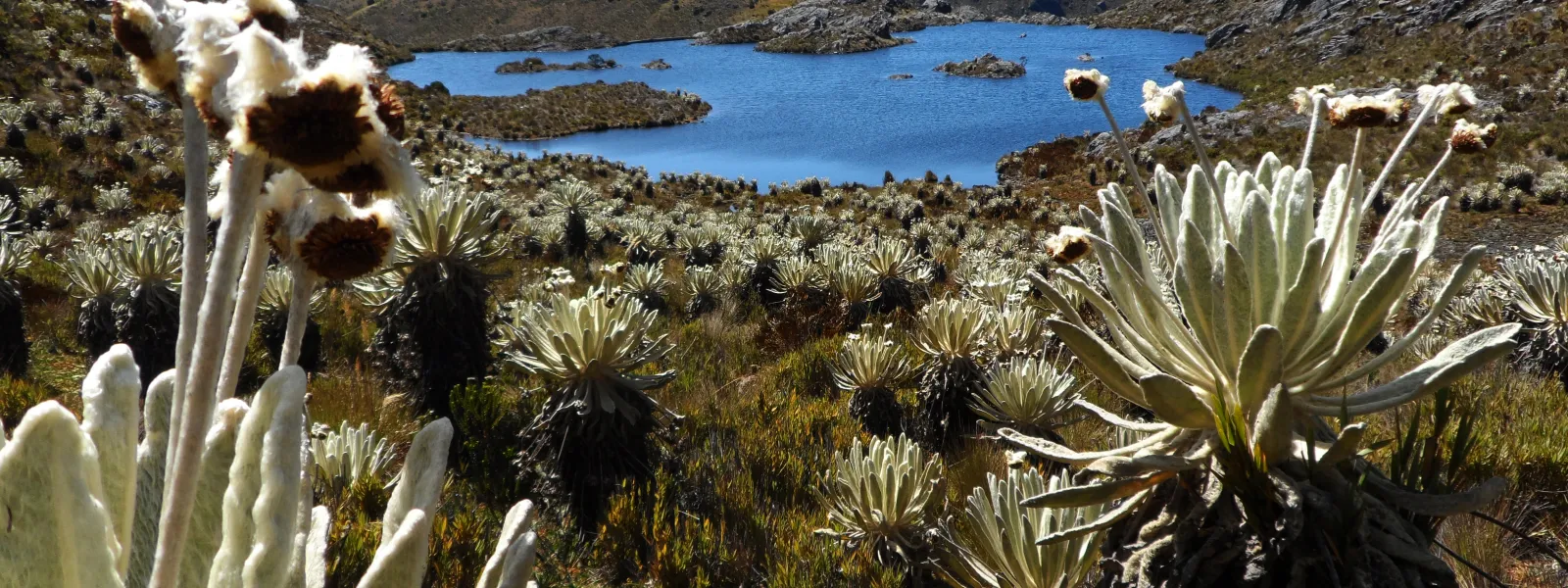
Project
Photo: Alberto Peña KayProtecting the Santurban Páramo from mining's damages
In the Andean region, high-altitude forests and wetlands called páramos capture water from fog and supply it to lowlands. In Colombia, nearly two million people rely on the Santurbán páramo for their freshwater supply.
Healthy páramos also capture large amounts of carbon, mitigating climate change, and provide refuge for hundreds of threatened species, including the iconic spectacled bear.
The land in and around the Santurbán páramo contains gold and other minerals. A Canadian corporation, Eco Oro minerals, wants to build a gold mine that would leak large amounts of cyanide and arsenic into the water coming from the páramo.
AIDA’s advocacy helped to convince the Colombian government to:
- Deny an environmental license for the Angostura mine in May 2011.
- Protect, in 2013, 76 percent of the Santurbán páramo from industrial activities—a much larger percentage than originally proposed
Together with our partners, AIDA advocated for the World Bank's divestment from the Angostura mining project, which we achieved in December 2016.
We also supported litigation that led Colombia’s highest court to reaffirm in February 2016 that mining in páramos is prohibited.
However, 24 percent of the Santurbán remains unprotected because it was not officially designated a páramo during the government's delimitation process, which was invalidated by a court system in November 2017 due to failure to consult with affected communities.
The government must now realize a new delimitation process in consultation with residents of the area. Meanwhile, the threats to Santurbán continue, with Eco Oro still angling to build its mine and another mining project seeking establishment nearby.
Partners:
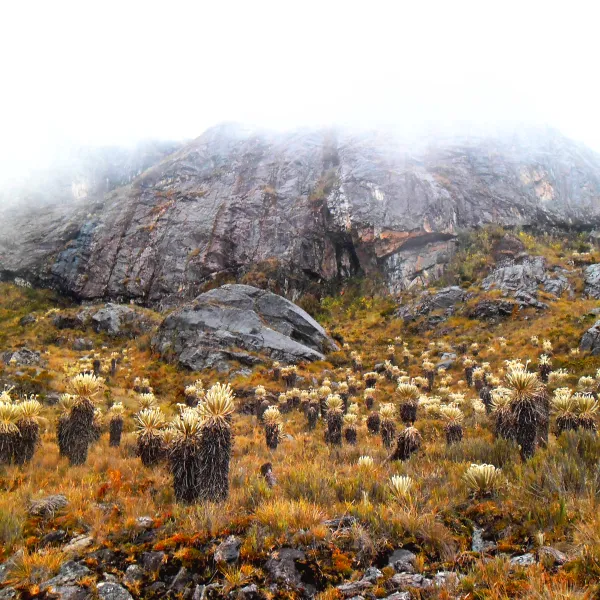
Related projects
Latest News
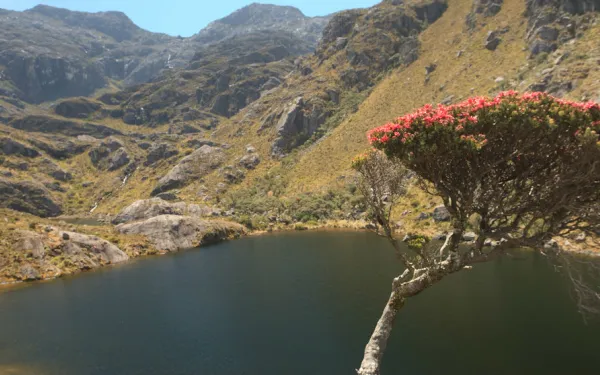
Civil society urges World Bank to withdraw funding from Colombian mining project
Organizations argue that the International Finance Corporation invested in a gold mine without taking into account potential environmental impacts, thereby failing to comply with its own investment standards. The proposed mine threatens Colombia’s Santurbán Páramo, a high-Andean ecosystem that provides water to millions of people. Washington, DC. A coalition of civil society organizations met at World Bank headquarters yesterday to demand that the International Finance Corporation (IFC), a member of the World Bank Group, withdraw its investment in the Angostura mine. The proposed gold-mining project would be located in Colombia’s Santurbán Páramo, a high-Andean ecosystem that supplies drinking water to more than two million people. The organizations also delivered a petition, signed by thousands of people from throughout the Americas, calling on IFC to withdraw its investment immediately. To present their demand, the organizations met with representatives of the IFC. They are also meeting with members of Congress and representatives of the US Department of State to discuss the situation in the Santurbán páramo and the risks its defenders face. The Committee for the Defense of Water and Páramo of Santurbán led the coalition, with support from the Center for International Environmental Law (CIEL), the Interamerican Association of Environmental Defense (AIDA), the Center for Research on Multinational Corporations (SOMO), and Mining Watch Canada. The demand presented yesterday tops off an important year in the fight to defend Santurbán. In March, the Canadian company developing the mine, Eco Oro, announced its intention to file an international arbitration suit against the Colombian government. In February Colombia’s Constitutional Court issued a ruling that bans all oil, mining, and gas operations in the country’s páramos. In August, an independent investigation undertaken by IFC’s internal watchdog, the Compliance Advisor Ombudsman, found that the investment in Angostura did not take into account the project’s potential environmental impacts, thus failing to comply with IFC’s own investment standards. The investigation was triggered by a complaint filed by the Committee and supported by the international organizations.
Read more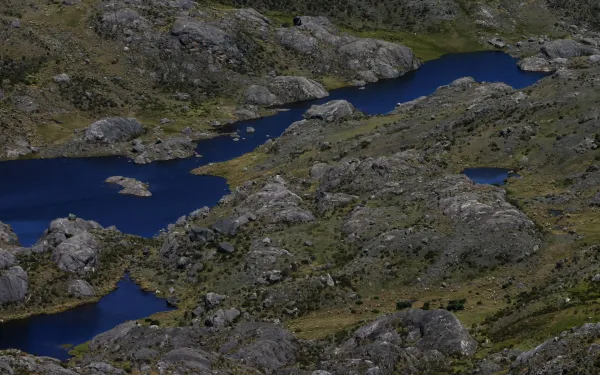
Ombudsman finds the IFC failed to comply with its investment standards in Colombia
The office of the Compliance Advisor Ombudsman found that the International Finance Corporation cannot guarantee that the Angostura mine will not have impacts on the environment. Washington/Ottawa/Bogotá/Ámsterdam. The office of the Compliance Advisor Ombudsman (CAO) has issued its final report on the complaint brought against the International Finance Corporation's (IFC) investment in Eco Oro Minerals’ Angostura mine in the high-altitude wetlands – known as páramos – of Santurbán, Colombia. The office warned that the corporation has not met all the standards required of its investments, including an assessment of potential impacts on biodiversity. The investigation was triggered by a complaint filed by the Comité por la Defensa del Agua y el Páramo de Santurbán (Committee for the Defense of Water and the Paramo de Santurban), with the support of the Center for International Environmental Law (CIEL), the Center for Research on Multinational Corporations (SOMO), the Interamerican Association for Environmental Defense (AIDA) and MiningWatch Canada. "The biodiversity of Santurbán is critical to ensuring our water supply. Therefore, any threat to its biodiversity affects the water resources of the entire metropolitan area of Bucaramanga," said Alix Mancilla, of the Santurbán Committee. The report also states that the IFC failed to assess the impacts of the entire mining project, and instead only concentrated on the impacts of the exploration stage, despite the fact that it justifies its investment on the basis of the supposed benefits that the eventual mine would bring. The CAO found that the "potential to comply with IFC’s environmental and social standards was uncertain and potentially challenging" during the extraction phase. In its conclusion, the Ombudsman points out that "one of the stated purposes of the IFC's investment was to develop the studies necessary to determine whether the project could comply with IFC's [performance standards]. " However, the company did not complete the required studies, including an Environmental and Social Impact Assessment, a biodiversity baseline study, and critical habitat assessments. Despite repeated lack of compliance by the client, the CAO found that the "IFC has not pursued a remedy, but has made subsequent investments in the company." "If the purpose of IFC's investment was to determine the viability of the project, there is no justification for the lack of studies – studies that are required to make an investment decision. You cannot greenlight a project in such a critical region for the population of Bucaramanga without assessing its actual consequences," declared Carla Garcia Zendejas of CIEL. The IFC's response to the Ombudsman’s report did not acknowledge any wrongdoing or make commitments to address its findings. Instead, the IFC merely reiterated its justification for investing in the project, claiming that the eventual mine will bring employment and revenue. The response is silent regarding its client's intent to file an investment dispute under the Canada-Colombia Free Trade Agreement. "It is very serious that despite failures in the risk assessment, the IFC has continued to invest in the Angostura mining project," added Kris Genovese, from SOMO. “It is disappointing, but not surprising, that the IFC has failed once again to respond to the findings of a CAO investigation.” AIDA attorney Carlos Lozano Acosta explained that “the project is illegal; that’s why its license was denied in 2011, and why the Constitutional Court ratified the prohibition of mining in páramos. It worries us that the IFC invested in a company whose project, from the beginning, was not viable, and who would file an international lawsuit against Colombia, one of the member states of the World Bank.” The report reveals that the IFC has an explicit policy of investing in junior mining companies with limited capacity to manage environmental and social issues, in countries where the regulatory framework is weak or not enforced. "It is time for the IFC to withdraw its investment in Eco Oro and stop investing in junior mining companies, as has been done in Colombia and elsewhere, knowing the serious social and environmental damage this entails and the context of impunity in which these companies are operating," stated Jen Moore of MiningWatch. "As communities affected by the mine, we will continue challenging the project in court, and we will use all legal means at our disposal to stop it, as we have done so far," affirmed Elizabeth Martinez from the Committee for Santurban. Currently, Colombia's Constitutional Court is considering a legal action filed by the Santurbán Committee with support from AIDA, concerning the lack of citizen participation in the demarcation of the wetland. A decision is expected soon. The IFC is the private-sector lending arm of the World Bank Group. The CAO is an independent accountability mechanism that receives complaints from people who may be affected by IFC investment projects. The CAO’s report and communiqué, including the IFC’s response can be found here: Communiqué: http://www.cao-ombudsman.org/cases/document-links/documents/CAOCommuniqueEcoOroSummaryofFindingsAugust252016.pdf Report: http://www.cao-ombudsman.org/cases/document-links/documents/CAOComplianceInvestigationReportonIFCinvestmentinEcoOroMinerals-English.pdf Response by the IFC: http://www.cao-ombudsman.org/cases/document-links/documents/EcoOro-IFCManagementResponsetoCAOInvestigationReport-5August2016.pdf
Read more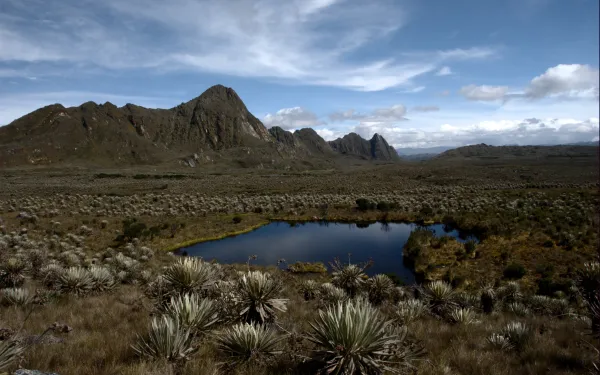
New law banning mining in Colombia’s páramos could draw its first lawsuit
The new law that bans mining in Colombia’s páramos took years to materialize, and was the product of multiple activist campaigns, lawsuits, and pressure from civil society to preserve one of the world’s most sensitive ecosystems. Last month, Colombia’s Constitutional Court approved a law that has no precent. It bans mining and oil exploitation –effectively blocking 473 already-existing concessions– in the country’s páramos. The law is expected to impact more than 300 mining operations in 25 moorlands, according to data from the National Authority of Environmental Licenses (ANLA). One of those companies is the Canadian transnational, Eco Oro. Its Angostura mine is located within the Santurbán moorland, in the Norte de Santander and Santander departments, within an area larger than 142,000 hectares. Santurbán includes five regional parks and a variety of species in danger of extinction, such as the condor (Vultur gryphus), the chirriador (Cisttothorus apollinari), the moorland duck (Anas flavirostris) and the curí (Cavia porcellus). On its website, the company has announced that it is “developing a multi-million ounce gold-silver deposit in Colombia.” Eco Oro has already completed more than 350,000 meters of drilling and 3,000 meters of underground development, thanks to an investment by the International Financing Corporation of the World Bank. Juan Orduz, president of Eco Oro’s board of directors, said back in 2014 –before the law was approved– that the company “has invested more than 240 million dollars in the region.”“It’s no secret that we’ve had many challenges and that we will keep having them. There’s always a new source of conflict, and even then, we’re going to keep coming up with strategies to keep working in this area,” said Orduz back then, when the demarcations for mining in Colombia’s páramos were an issue of conflict. In a recent press release, Eco Oro announced that it has the option of bringing the dispute to international arbitration and seeking “monetary compensation for the damages suffered” due to the new anti-mining law. “Since the Angostura project got underway, it has been clear that páramos are constitutionally and legally protected and that this project could affect Santurbán, such that it might not be authorized,” said Carlos Lozano Acosta, an attorney with the Interamerican Association for Environmental Defense (AIDA). “States should not be sanctioned for protecting their water sources, given that they are doing so in accordance with national and international obligations.” According to data from the Institute of Biological Research Alexander Von Humboldt, half of the world’s páramos are in Colombia and are the source of 70% of the fresh water in the country, besides being an ecosystem essential for mitigating climate change. Their importance is especially acute right now, since Colombia is facing the El Niño climate phenomenon and going through one of the worst droughts in its history. Eco Oro’s critics explain that five years ago, Colombia’s Environment Ministry had denied the Angostura mine its environmental license. And now, the decision of the Constitutional Court reaffirms that decision, “finding that the right to water and the protection of the páramos (moorlands) takes precedent over the economic interests of companies trying to develop mining projects in these ecosystems.” That’s according to Miguel Ramos, from the Water Defense Committee and the Páramo of Santurbán (El Comité por la Defensa del Agua y el Páramo de Santurbán). The Committee has presented a complaint about the Angostura mining project to The World Bank, and hopes to receive a response in the next few months.
Read more